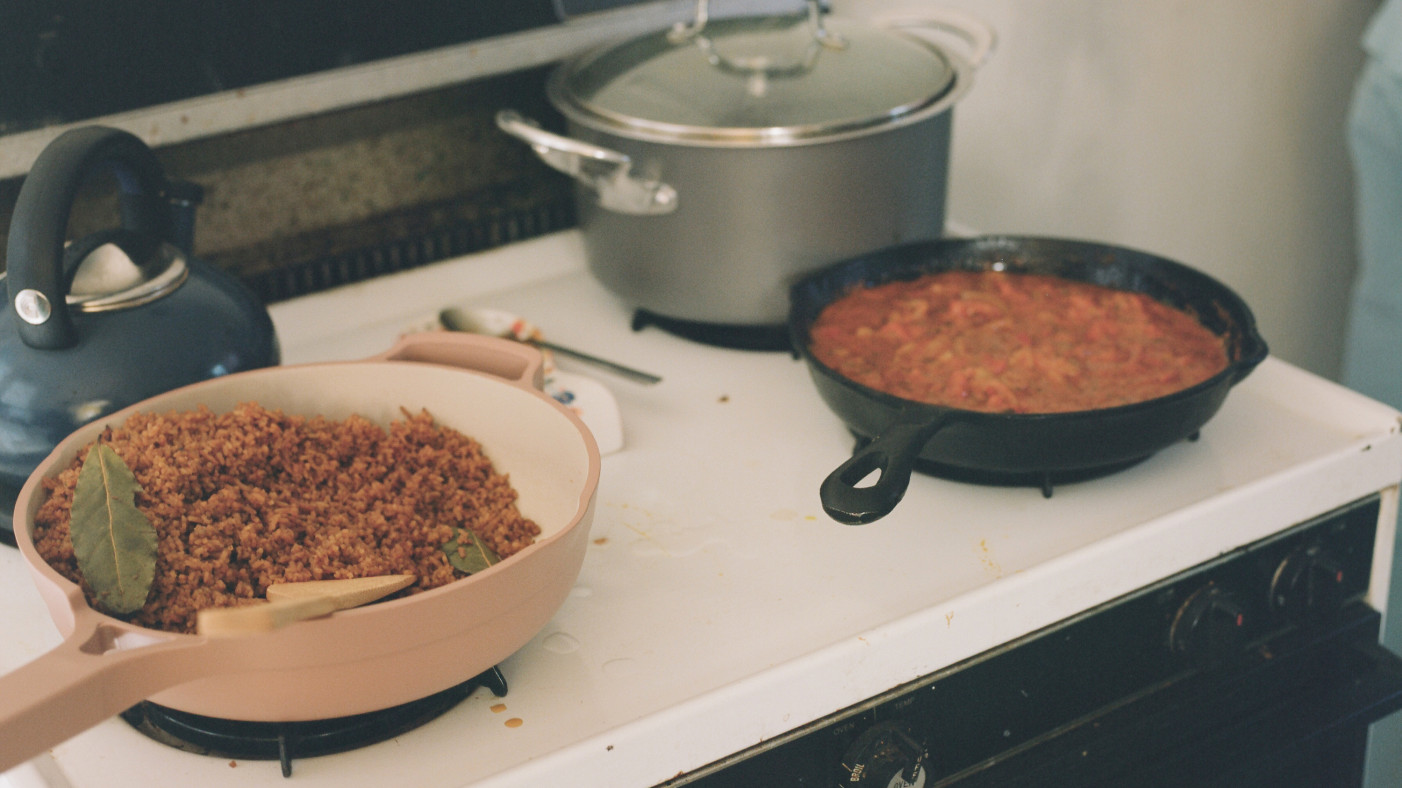These Designers Created a Pan That Is Able to Replace Most of Your Cookware by Itself

The word “disrupt” and the idea of disrupting darts around the startup world like a toddler after too many cookies: irrationally, chaotically, and generally unhinged from its true purpose. But every once in a while, a product emerges that actually has the potential to shake up an industry, and the Always Pan—made by a company started by Malala Fund cofounder Shiza Shahid—just might be that item in the cookware space.
Produced by a dream-team trio, the pan is designed to replace almost an entire cookware set in the home kitchen—and it does so in an inclusive way. Deep enough to be a saucepan, wide enough to use as a frying pan, light enough to sauté in but heavy enough to fry in, it aims to work as well for cooking Western European dishes as cuisine of the Indian subcontinent. Somehow, it manages to avoid the common folly of “Jack of all trades, master of none.” Instead, says Our Place cofounder Zach Rosner, “we’re challenging the idea that you need a master of one specific thing.”

Shahid, Rosner, and their third cofounder, Shahid’s husband, Amir Tehrani, set out to create a company that made kitchenware for today’s kitchen and consumer. Tehrani came up through his family business, one of the largest domestic kitchenware suppliers, and brought his experience in the industry to the team. Rosner came with his experience at the startup level of companies like MeUndies and Everlane, and Shahid brought vision, storytelling, and her knowledge from the impact investment world.
“Millennials are forming households and buying cookware, but there isn’t a brand that speaks to them,” Shahid says. She saw the need for cookware that fit small kitchens and looked good on Instagram, but she also considered what her neighbors in Los Angeles were cooking. She cooked the Pakistani food she grew up on, along with the California-style cuisine of her new home. Next door, someone might be making Mexican, Vietnamese, or Chinese dishes.

The Always Pan, the company’s signature product, is presented as cookware for the multiethnic kitchen—designed not just for classic French or Italian cooking, but for all techniques. The team saw other cookware startups trying to do the same thing as All-Clad, but for cheaper—or making an updated version of a Le Creuset Dutch oven.
“Literally every single company that makes cookware, whether it’s a brand-new startup or a company that’s been around for 200 years, they all make cookware the same way. They make all these different things intentionally designed to be good at a few things,” says Rosner. “But people only have four burners on the stove top.”
The cofounders drew a Venn diagram of the different sizes and shapes of cookware from cuisines around the world, those used by both chefs and home cooks. And where all those circles intersected, Rosner recalls thinking, “Well, can we make just one thing that can do all this stuff?” The pan, made from heavy gauge cast aluminum with a nonstick coating and Bakelite handle, comes with a nesting steamer basket, pour spouts, a top, and a spoon with a notch that anchors it to the pan so that any excess food drips back in. You can fry an egg in it, make pasta, make soup, get a crisp crust on your fried rice—almost anything done on the stove top. (It is not, however, oven-safe.)

Once they had the pan concept, Tehrani’s experience and connections in the existing kitchenware industry made it a safe bet for investors. “Amir’s background allows us to really uniquely have pretty incredible margins on our product,” Rosner explains. “Venture investors want to know that.” Together, the team raised $2.4 million from retail giant FabFitFun, Will Smith, and the founders of brands such as Foodspotting, Tinder, and Sugarfina.
But beyond the difference in the pan, Shahid strived to create a brand that didn’t imitate competitors. “You walk into a Bed Bath & Beyond, and it’s a really unpleasant experience,” she says, explaining that there are too many options and little clarity on what you actually need as well as which pots and pans will offer the most value.
Then there’s the “particular style of photography of food” Shahid observed over and over in other brands’ marketing. “Pakistani food has never been shown in a Williams Sonoma catalog,” she notes. It was something she saw reflected in the wider world. “I noticed a growing fear of people who looked like me,” Shahid says, underscored as an immigrant and a woman of color in America. So she set out to combat that with her kitchenware company.

For the first brand campaign, Our Place partnered with the Los Angeles Food Policy Council and went into South L.A., interviewing people working in the area of food justice as part of the company’s mission to “invest in telling real stories.”
The second campaign, launching this month, centers on the celebration of Nochebuena, featuring Our Place’s new sustainable, artisanal products sourced from craftspeople in Oaxaca, in keeping with the ethical-sourcing piece of its mission. (The Always Pan is produced in a women-owned factory that Our Place vets for working conditions, processes, and quality control.)
It’s all part of the company’s long-term plan to set itself apart by making products for the modern, diverse American kitchen—and for millennials who, by and large, have been found to care more about what their money supports than just what they are buying. “Not just donating money,” Shahid points out, “but making better choices at every step.”
And for Shahid, that intersected perfectly with the change she hoped to effect in the world by bringing people together over food: “There was an opportunity to show people that we’re not that different when you sit down across the dinner table and share stories. Muslim or Jewish or Christian or immigrant, everybody likes bread.”
Original Post: Fortune, Naomi Tomky, 11/28/19